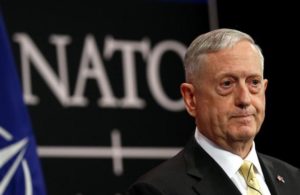by WorldTribune Staff, February 17, 2017
Military collaboration between the United States and Russia against Islamic State (ISIS) in Syria is unlikely anytime soon, U.S. Secretary of Defense James Mattis said.
“We are not in a position right now to collaborate on a military level. But our political leaders will engage and try to find common ground,” Mattis told reporters after talks at NATO headquarters in Brussels on Feb. 16.

Hours before Mattis spoke, Russian President Vladimir Putin said it was in the interests of both nations to restore communications between their intelligence agencies.
“It’s absolutely clear that in the area of counter-terrorism all relevant governments and international groups should work together,” he told Russia’s Federal Security Service (FSB).
The resignation of national security adviser Michael Flynn was a blow to Russia-U.S. cooperation, analysts said, as Flynn was seen in Moscow as a leading advocate of warmer ties with Putin’s regime.
An aide to the Russian president said there had been no progress on a potential meeting between President Donald Trump and Putin. “There is no agreement on a meeting nor a clear understanding yet,” Interfax news agency quoted Kremlin aide Yuri Ushakov as saying.
Mattis, who has previously accused Russia of trying to break the NATO alliance, told a closed-door session of NATO on Feb. 16 that the alliance needs to be realistic about the chances of restoring a cooperative relationship with Moscow, citing Putin’s 2014 annexation of Crimea from Ukraine, which plunged U.S.-Russia relations to a post-Cold War low. Mattis said NATO needed to “negotiate from a position of strength” as he called for stepped up military spending.
In a reply to Mattis’s comment, Russian Defense Minister Sergei Shoigu was quoted by TASS as saying: “Attempts to build a dialogue with Russia from a position of strength would be futile.”
Mattis shot back: “I have no need to respond to the Russian statement at all. NATO has always stood for military strength and protection of the democracies and the freedoms we intend to pass on to our children.”
Asked whether he believed that Russia had interfered in U.S. presidential elections, Mattis said: “Right now, I would just say there’s very little doubt that they have either interfered or they have attempted to interfere in a number of elections in the democracies.” He did not explicitly cite the U.S. election.
